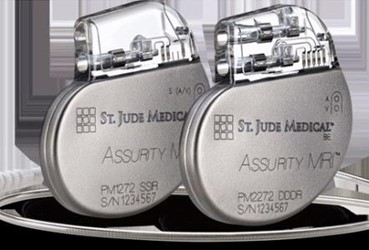FDA Approves Abbott's MRI-Compatible Wireless Pacemaker

Abbott has announced that the FDA approved MR-conditional labeling for its Assurity pacemaker, touted by the company as the “world’s smallest and longest-lasting” MRI-compatible wireless pacemaker. The U.S. launch for the Assurity and the Tendril MRI pacing lead is expected to jumpstart the St. Jude — now owned by Abbott — cardiac rhythm management business, which has been “challenging” in recent quarters.
The Assurity pacemaker received CE Mark approval in May 2015, and FDA approval was expected to follow shortly after, but experienced some delays, according to the Star Tribune. The subsequent launch of similar MRI-compatible pacemakers by competitors Boston Scientific and Medtronic undercut St. Jude’s bottom line in its cardiac rhythm segment.
In St. Jude’s last quarterly earnings call before acquisition by Abbott, CEO Mike Rousseau commented that the cardiac rhythm business was “challenged” by portfolio gaps, but these were expected to resolve once FDA approvals came through in early 2017. Abbott’s $25 billion acquisition of St. Jude was finalized earlier this month.
According to Abbott, the Assurity pacemaker is the world’s smallest pacemaker that can wirelessly transmit data and communicate with remote monitoring equipment, a feature aimed at reducing doctor visits and improving care of chronic conditions. In a press release, Abbott cited recent guidelines from the Heart Rhythm Society that established remote monitoring as the standard of care.
The Assurity can pace two chambers of the heart simultaneously and is compatible with full body MRI scans. An external handheld device called an MRI activator adjusts settings on the implant, making it safe for MRI while still meeting individual needs of the patient. This technology is intended to reduce time and effort of implant reprogramming, which has conventionally been required pre- and post-scan.
“A long-lasting and small wireless pacemaker that allows patients to undergo MRI scans is an important step forward in growing our available treatment options for patients,” said David Sandler, director of electrophysiology at the Oklahoma Heart Institute in Tulsa. “The ability to choose a device to best address a patient’s cardiac condition no longer has a tradeoff with MRI compatibility. It’s the best of both worlds.”
Abbott has been working with regulatory bodies worldwide to secure MR-conditional labeling for its most popular cardiac implants, including pacemakers, cardioverter defibrillators, and cardiac resynchronization (CRT) devices. Along with the Assurity, the FDA also approved MR-conditional labeling for the Tendril MRI pacing lead, which has been implanted in more than 200,000 patients worldwide, said Abbott.
Both the Assurity and Tendril “will help provide patients access to diagnostic procedures while delivering the product performance physicians need to provide the best possible care to their patients,” said Avi Fischer, medical director for Abbott’s cardiac rhythm management business.
Access to Medtronic’s Micra Transcatheter pacing system was recently expanded by a decision from the Centers for Medicare and Medicaid to cover the devices through Medicare’s policy of Coverage with Evidence Development (CED). Under this policy, coverage is predicated on continued post-market evaluation of the device to address additional research questions.
